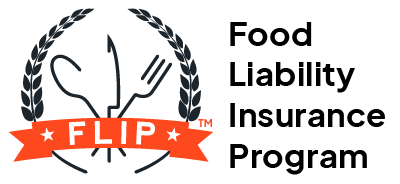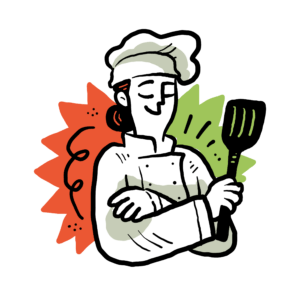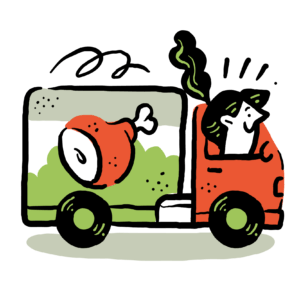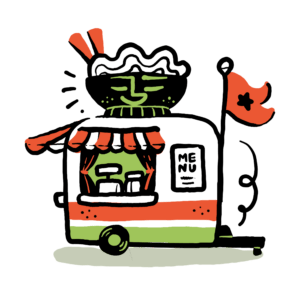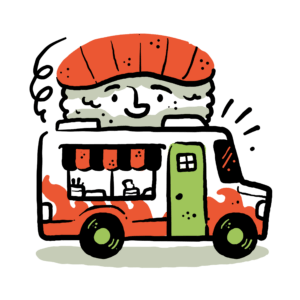Commercial Auto Insurance for Food Businesses
When your food or beverage business hits the road, you need coverage that keeps up. Protect your food truck, trailer, or catering van with customizable commercial auto insurance from Food Liability Insurance Program (FLIP).
What Is Commercial Auto Insurance?
Commercial auto insurance for food businesses is designed to protect you from the financial impact of accidents or damage to your work vehicle. It provides coverage for both physical damage and liability, specifically tailored for commercial vehicles rather than personal ones.
Who Needs Commercial Auto Insurance?
You need commercial auto coverage for your food or beverage business if you:
- Own, lease, or rent vehicles that you use for your business operations
- Have employees who drive their personal vehicles for business, such as delivery drivers
- Have employees who drive owned, leased, or rented business vehicles
Businesses that need commercial auto include (but are not limited to):
What Does Commercial Vehicle Insurance Cover?
Commercial auto can include the following coverages:
- Liability: Pays for third-party bodily injury expenses (medical bills, rehabilitation, etc.) and property damage caused by your vehicle.
- Uninsured/underinsured motorist: Protects you if your commercial vehicle is involved in an accident with another driver who does not have sufficient liability insurance (or any liability insurance) to cover your damages. Coverage options, limits, and requirements vary by state.
- Medical payments: Covers the medical expenses you or any passengers in your commercial vehicle have after an accident or other vehicular incident. It is a no-fault coverage.
- Comprehensive: Pays for repairs or to replace your vehicle after damage not caused by a collision with another vehicle, such as hitting an animal, a tree falling on your vehicle, or glass breakage.
- Collision: Covers the cost of repairing or replacing your commercial vehicle if it is damaged in a collision, overturns, or rolls.
What Types of Vehicles Are Covered?
This policy can cover a wide variety of vehicles you use for business, including:
- Cargo vans, pickups, and utility trucks
- Food trucks
- Large trucks (dump trucks, tractor trailers, etc.)
- Passenger vehicles
- Trailers
What Does Commercial Auto Insurance NOT Cover?
Like all insurance policies, commercial auto has exclusions such as:
- Business equipment that is not permanently attached to your vehicle (requires inland marine coverage)
- Damage due to wear and tear
- Driving under the influence (DUI)
- Employee injuries that occur outside of the employee driving the vehicle
- Intentional damage to the vehicle
- Theft of personal items
Always refer to your commercial auto policy for a full list of exclusions.
How Does Commercial Auto Insurance Work?
Your commercial auto policy works similarly to your personal auto policy, except it’s designed to cover claims relating to your business vehicle. Commercial auto insurance is designed to cover some or all of the associated costs if you or anyone named on your policy (e.g., your employees) causes injuries or property damage while driving your work vehicle.
If your work vehicle is damaged or destroyed during an accident, commercial auto can also cover repairs or a replacement if you added collision and comprehensive coverage to your policy.
What Are Common Commercial Auto Insurance Claims?
- Collision with other vehicles, people, animals, or property
- Damage caused by a windstorm
- Fire
- Hit-and-run accidents
- Theft
- Vandalism
How Much Does Commercial Auto Insurance Cost?
The cost of your premium is affected by the following factors:
- Your coverage needs
- Your/employees’ driving history
- Your location
- Your profession
Why FLIP for the Best Commercial Auto Insurance?
FLIP provides reliable, online commercial auto insurance catered to the food and beverage businesses we cover.
In just a few clicks, choose your coverage limits and customize your policy with optional add-ons. With FLIP, hit the road with confidence — a feeling that only comes from knowing your vehicle is backed by a policy that keeps your business moving forward.
Business owners in the following states are eligible for commercial auto coverage from FLIP:
- Arizona
- Colorado
- Connecticut
- Florida
- Georgia
- Illinois
- Louisiana
- Maryland
- Michigan
- North Carolina
- New Jersey
- New York
- Ohio
- Pennsylvania
- South Carolina
- Tennessee
- Texas
- Utah
- Virgina
FLIP Customer Testimonials
Read what others say about their experience from over 350+ reviews.
Coverage Details
Bodily Injury and Property Damage Liability
Up to $250,000 per person / $500,000 per accident / $100,000 per property, or a combined single limit up to $2,000,000
Underinsured Motorist Bodily Injury
$25,000 person / $50,000 accident
Uninsured Motorist Property Damage
$10,000 with $100 deductible, $300 hit and run deductible
Personal Injury Protection
- $10,000
- $35,000
Medical Payments
Up to $10,000 each person
Comprehensive
Up to $5,000 deductible
Collision
Up to $5,000 deductible
You need both commercial and personal auto coverage if you fit the following criteria:
- Have a vehicle that you use for personal reasons, including commuting to work (requires personal auto insurance)
- Use that vehicle or a separate one for business reasons, such as delivering food, selling food, or transporting food to events (requires commercial auto insurance)
Most commercial auto policies will allow you to use your business vehicle for personal reasons, but the reverse is typically not true for personal auto policies.
- Drive safely: Having a clean driving record is the best way to keep your premium low. Practice safe driving habits when operating your commercial vehicle and encourage your employees to do the same. Be sure to check your employees’ driving records before hiring them.
- Lower your limits: Decreasing your combined single limit (CSL) lowers your premium, but we don’t recommend it. A lower CSL means you have less coverage in the event of a multi-person accident.
- Increase your deductible: You can lower your premium by opting for a higher physical damage deductible. However, this also means you’ll have to pay more out of pocket for a covered accident.
